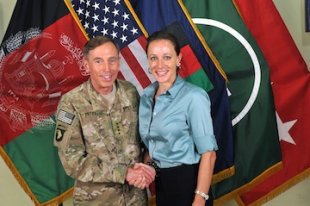 Gen. David Petraeus and Paula Broadwell in July 2011 (ISAF via Getty Images)It seemed the story behind Gen. David Petraeus' resignation as director of the CIA couldn't get stranger. New reports, however, now indicate that Marine Gen. John Allen, another well-respected, high-ranking general, might be involved in the growing scandal.
Gen. David Petraeus and Paula Broadwell in July 2011 (ISAF via Getty Images)It seemed the story behind Gen. David Petraeus' resignation as director of the CIA couldn't get stranger. New reports, however, now indicate that Marine Gen. John Allen, another well-respected, high-ranking general, might be involved in the growing scandal.
On the surface, the case so far involves the FBI; a slew of allegedly inappropriate emails (between Petraeus and his biographer, Paula Broadwell; Allen and socialite Jill Kelley; and allegedly threatening ones Broadwell sent to Kelley); the FBI agent who started the probe, who's now being investigated for sending "shirtless" photos to Kelley; and, as reported by the New York Post on Tuesday morning, a child custody battle involving Kelley's twin sister that allegedly concerns both Petraeus and Allen.
To help sort things out, here's a rundown of events, and where things currently stand.
Jill Kelley, a 37-year-old from Tampa, Fla., who organized local social events for the military as a volunteer, became friends with Petraeus and his family when he was stationed in Florida. Last spring, she began receiving harassing emails from an anonymous account and alerted a friend who worked for the FBI.
The FBI began an investigation, which eventually uncovered an affair between Petraeus and Broadwell, both of whom are married. The FBI believes Broadwell sent the harassing emails to Kelley because she perceived her to be a rival for Petraeus' affections.
The FBI found something else during the inquiry: 20,000 to 30,000 pages of emails and other communications between Kelley and Allen, the top commander in Afghanistan and a nominee to become the new NATO supreme allied commander for Europe.
A senior defense official has told the Washington Post that the emails were "potentially inappropriate." Other sources strongly denied to the Post that anything inappropriate ever happened between Allen and Kelley, but said that Allen may have used terms of endearment such as "sweetheart" to refer to Kelley in his emails to her. The source said Allen, who is married, is "embarrassed" by this, but did not have an affair with her. Allen also received an email from the same account that was harassing Kelley, though it's unclear what the email said.
Both Petraeus and Allen also wrote letters submitted to a court on behalf of Kelley's twin sister, who was locked in a nasty custody fight with the father of her 4-year-old child. The generals vouched for the sister's abilities as a mother, the Post reported.
The Tampa party planner, who is married and has three children, is also at the center of another bizarre twist in the case. The Wall Street Journal reported on Monday night that Kelley's FBI agent friend was taken off the Petraeus case and is currently being investigated because his superiors discovered that he sent "shirtless" photos to Kelley before the probe started. After the agent was removed from the case, the agent contacted Washington Rep. David Reichert to warn him that he thought FBI leaders would sweep the investigation under the rug.
Meanwhile, the Daily Beast, citing an anonymous source, reports that the harassing emails allegedly sent from Broadwell to Kelley did not say "stay away from my guy" as previously reported, and did not even directly reference Petraeus. The source described the tone of the emails as "more like, 'Who do you think you are? You parade around the base. You need to take it down a notch.'" The Wall Street Journal reported that one email, without elaborating, asked Kelley if her husband knew what she was doing. Another said the sender knew Kelley had touched "him," without specifying who the "him" was.
And, the Associated Press has uncovered the trick Broadwell and Petraeus used to email each other without creating an online trail. The pair set up anonymous email accounts and drafted emails to each other without ever pushing "send." Each one could log on to the other account and click the "drafts" folder to see if a message had been left for them. This avoids creating an easily traceable email trail, the AP reported.
One question the Daily Beast raised is why the FBI investigated the harassing emails sent to Kelley in the first place. There were no overt threats, such as "I'll kill you," in the emails, and some wonder if Kelley's friendship with the FBI agent may be why the agency investigated what seemed like a humdrum case better suited to local authorities.
Broadwell's father, for one, told the New York Daily News that he thinks the scandal is a smoke screen for a bigger story. "This is about something else entirely, and the truth will come out," Broadwell's father, Paul Krantz, told the Daily News. "There is a lot more that is going to come out."










